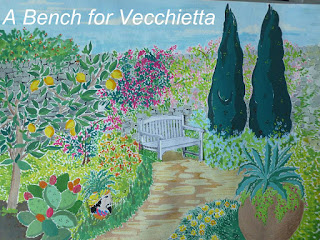A BENCH FOR VECCHIETTA - PART 4
I
had been working on a large and lengthy job in Milan when your long
message came, Vecchietta and I read it in the airport just before
boarding my flight back to Sicily. Never had a 90-minute flight
seemed so long!
When
I picked up my van at Catania, I decided not to go and see relatives
there as I usually do when returning from a trip, but to make
straight for Centochiese – and you, Vecchietta.
Why,
I asked myself on the journey, had I left it so long? Becaue I'm a
fool, Vecchietta – yes, I, Cicciu the carpenter, who can fix
anything, except my own heart, at last admit I'm a fool. When I left
you, my love, I didn't think it would be for all these months – just long
enough for us both to cool down, I thought, for my fear to subside. I
honestly expected you to call or message me, ask for my help with
things – which I would willingly have given – but I'd reckoned
without your British pride and your sense of dignity. You once told
me that a British person is at their most dangerous when they are
silent. I couldn't work it out, Vecchietta: you didn't phone me in
tears, or shout in rage, or reproach me for all I'd done to you. That
I could have dealt with because I would have understood it but I was
no match for your silence. When we occasionally met in the centre of
Centochiese you would nod and smile but you would square your
shoulders and walk away quickly. And I, afraid of hurting you
further, did not come after you.
Yes,
Vecchietta, I remember the night you cut your hand. I wanted to
cradle you then and kiss it better, as if you were a child, but I
held back. We went slowly in those days, didn't we? Perhaps later,
when passion did its work on us, we went too fast; I don't know. I
only know that something uncontrollable happened between us and,
though it took me longer to develop strong feelings for you, I had
them, Vecchietta. Why else would I have gone away? Monte degli Agrumi
and the restaurant: I was so proud to have you with me that cold,
February night; to show my friends in the restaurant that I knew such
an elegant, cultured, foreign woman. On the way back in the van, you
told me more about your life and I was stunned to realise how strong
you were and yet how vulnerable. Perhaps it was that that scared me
most, Vecchietta. I'd forgotten about the Prosecco in the bathroom;
Yes, I did think you were crazy and seriously so but now I realise
you were just being British.
British,
British – even after all this time, I cannot equate the passion you
showed towards me with the image we Sicilians have of a cold people
from an even colder, grey country where it never stops raining. But
then, you always surprised me, Vecchietta, and in your letter, you
have done so again.
Those
were my thoughts as I drove , like a madman even for a Sicilian,
towards you, my tiramisù lady. But then, in Centochiese, my first
stop was at the bar where I had so often bought pastries for you.
The barman did not smile as he usually does when he sees me but
asked,
“Cicciu,
have you heard what happened to the professoressa?”
Then
he and half a dozen others who were there all spoke at once, telling
me you had had a stroke a few days before and were in the hospital.
I
didn't stop to drink my coffee, nor did I pay for it. Instead, I ran.
Centochiese is busy on market day and the traffic jams are legendary.
So I continued running, losing my cap on the way, with people
shouting,
“Cicciu,
are you off to the hospital?”
[We
thought we'd been discreet, Vecchietta. We thought that nobody knew.
As it turned out, everybody knew.]
I
ran so fast through the market square that I knocked over the fabric
stall, the lingerie stall which had fascinated you because the women
fought over the items and an olive stall, slipping on the spilled
fruit as I apologised. No one yelled and the crowds parted for me
like the Red Sea for Moses. And still there were shouts of,
“Cicciu,
she's in the stroke unit. Cicciu, say hello from me!”
At
last, breathless, capless, dishevelled and frantic, I arrived at the
hospital and was directed to your ward. But I was too late,
Vecchietta – too late for you, and too late for our love.
To be continued
To be continued





Comments
Post a Comment